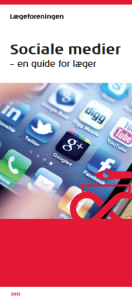Judging from the number of courses, guidelines etc. on the use of social media in health care, Denmark is now also becoming aware that there is something to it. The Danish Medical Association just published an advisory guide to their members on how to deal with social media, and Dagens Medicin, a Danish newspaper for health professionals, is offering a one-day course on social media in the health sector. An almost identical half-day course is offered by the Medicademy (an international educational program by The Danish Association of the Pharmaceutical Industry) which focuses on how the pharmaceutical industry can use social media in their communication. Both courses come at a quite heavy fee of 2700 DKK per person (475 USD).
A communication expert and case stories
The two courses are very similar in their structure and speakers – and price. Both courses have a broader social media expert as their first speaker. It is not a person from the health sector, but communication specialist Elisabeth Tissot Ludvig, who is director of a private communication and PR company specialising in Health Care Communication. Elisabeth Tissot is also an occasional blogger [in Danish] at The Danish Medical Bulletin, where she blogs about Danish medical doctors’ communication habits.
The two courses offer various speakers from the health sector who according to the programme will share experiences in using social media in relation to their profession. This includes a blogging doctor; a researcher in patient blogs; a nurse who have used social media in recruitment of personal; and a pharmaceutical company’s use of apps in communicating with patients. Through these examples it is the objective of both courses to spread knowledge of social media and its potential role in the Danish health care and pharmaceutical sector.
Focus on legal issues, not much about science communication
At both courses and in the folder from the Danish Medical Association, legal aspects of the use of social media play a mayor role. A lawyer will present legal restrictions in using social media in a health context. The guide from the Danish Medical Association is almost entirely focused on legal issues and advice on what not to do or avoid doing when online. The advice is sound enough, because of course there are issues to be aware of when communication, regardless of what media is used. I miss, however, some words on what social media could be useful for. Examples of benefits of being online as a medical doctor or other health care personnel. The folder seems to be mostly fear driven and not very balanced on potential advantages for doctors to go online.
of the use of social media play a mayor role. A lawyer will present legal restrictions in using social media in a health context. The guide from the Danish Medical Association is almost entirely focused on legal issues and advice on what not to do or avoid doing when online. The advice is sound enough, because of course there are issues to be aware of when communication, regardless of what media is used. I miss, however, some words on what social media could be useful for. Examples of benefits of being online as a medical doctor or other health care personnel. The folder seems to be mostly fear driven and not very balanced on potential advantages for doctors to go online.
Twitter, which I myself find to a kind of glue that connects the different kinds of social media and attach it to traditional media, is only briefly mentioned in the course offered by Dagens Medicin. Here Twitter will be presented by a popular comedian. Of course there can be an intention to add a more light and less formal speaker to the programme, but seen from my perspective it is a shame that a health related tweeter couldn’t be invited.
Another thing I miss in the programme is how social media can be used in research and in research communication. Research is an integrated part of the Danish health system and it would have been interesting to have added social media’s role in science communication to the programme. But perhaps that is an entire course in itself…
Regardless, the guide from the Danish Medical Association and the two courses, indicate that social media in relation to health care is an emerging issue also an Denmark. If not among the older generation then surely among the younger generation of doctors, nurses, researchers, public health specialist etc. who have grown up with social media as a natural part of their lives.
public health science communication
Inflation in teachings on social media in Danish health care
Judging from the number of courses, guidelines etc. on the use of social media in health care, Denmark is now also becoming aware that there is something to it. The Danish Medical Association just published an advisory guide to their members on how to deal with social media, and Dagens Medicin, a Danish newspaper for […]


